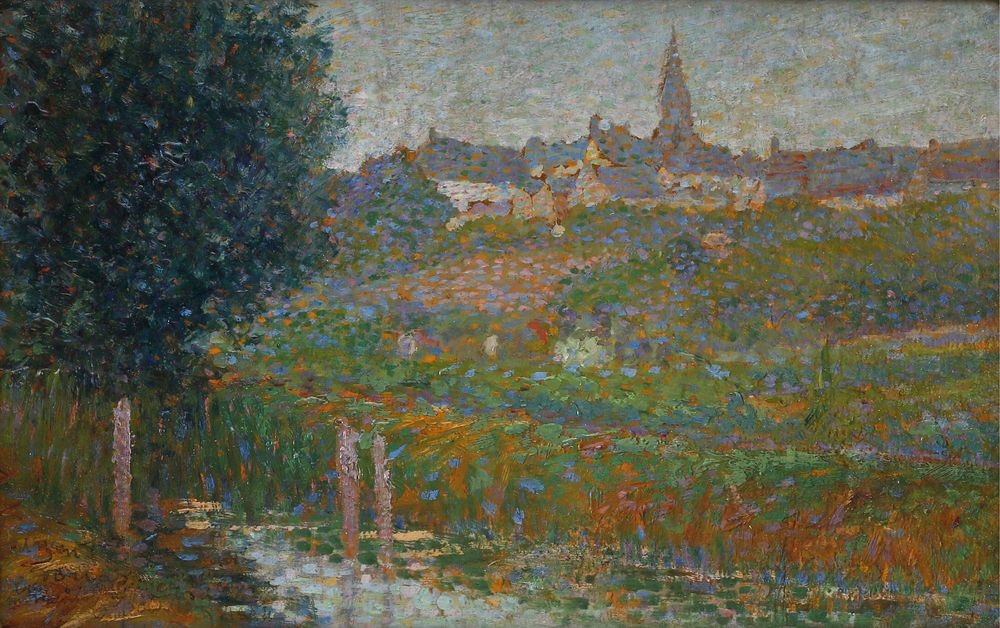
Léon Pourtau
Bord de rivière et village
1894
Oil on cardboard
6,37 x 9,84 in
Signed and dedicated lower left: « À mon très cher ami Dorias. Souvenirs de bonnes amitiés et ses bons moments. . . ensemble ; L. Pourtau 1894 »
Provenance
François Dorias collection, painter and artist’s friend. Private collection.
Bibliographie
Gilles Caillaud, Hélène Bailly-Marcilhac & Charles Bailly, Léon Pourtau: vie et oeuvre d’un pionnier du pointillisme: essai de catalogue raisonné, Skira Editions, Milan, 2014, no 29, illustrated p.115.
A press article dedicated to Louis Pourtau for Le Soleil (July 11, 1898) has been past on the reverse of the canvas; read below the transcription:
La peinture l’attirait et le prenait tout entier. Au premier moment de liberté il partait pour les bois des environs de Paris avec sa boite à couleur et il copiait la nature, jamais satisfait, toujours inquiet de lui-même, au lieu qu’en musique, quand il avait étudié et réussi à bien jouer un solo très ardu, il disait à son entourage d’amis : « Dieu ! Que c’est ennuyeux la musique! Une fois qu’on tient un morceau, on sent qu’on ne l’exécutera jamais mieux, il n’y a plus rien à chercher. »
Il rougissait en somme d’être musicien, la musique était pour lui son gagne-pain, mais rien de plus. Dans son entourage, on savait que pour le faire enrager il n’y avait qu’à parler obstinément musique : l’effet était irrésistible. Pourtau se lançait dans les théories qui lui étaient chères sur l’idée de continuelle perfectibilité où plutôt d’incessante imperfection de la peinture, opposée à la perfection mécanique, mathématique de la musique. Il ne se calmait que quand il finissait par s’apercevoir qu’on avait simplement voulu le plaisanter en exprimant un avis contraire, mais il espérait toujours au fond avoir convaincu son contradicteur.
La maison qu’il avait louée à Lyon, une modeste habitation enfouie dans la verdure, à mi-côte de la colline de Fourvière, était exquise de simplicité ; elle disparaissait dans la charmille, les roses et les glycines, le jardin était luxuriant de végétation, tellement luxuriant qu’on avait de la peine à s’y frayer un chemin, tant l’herbe y poussait dru. Pourtau s’installait dans les broussailles ou dans les fleurs, et là, éperdu de rêve et de poésie, il cherchait à rendre le spectacle qu’il avait sous les yeux. Mais la fatalité voulut encore que se fût la musique qui l’emportât dans la lutte. Un jour il joua dans un concert, un imprésario américain l’entendit émerveillé et lui fit des offres superbes pour qu’il vint donner des auditions à Boston : soixante mille francs pour trois ans avec traité renouvelable. C’était la fortune. Pourtau, après trois années d’exil, revenait avec sa femme pour revoir son pays natal, revoir ses amis : Il n’aura pu réaliser son rêve.
Pour me prouver qu’il n’oubliait pas la peinture, il m’avait adressé de Boston, il y a deux ans, une exquise carte de visite, un tableautin représentant un passage au bord d’une rivière. Pourtau était un pointilliste tout à fait distingué. Sans se laisser déborder par le procédé, il savait donner à la toile une lumière, une vibration tout à fait intenses. Sa peinture se vendait du reste fort bien en Amérique. Avec quel soin pieux je vais garder son dernier souvenir ! La mer et la mort sont vraiment impitoyables.
[Painting was attracting and swallowing him. At the first sight of freedom, he was going for a walk by the woods close to Paris with his color box and was reproducing the nature, never satisfied , always worried about himself, compare to music, when he studied and succeeded playing a tough solo, he used to say to his friends: « God ! Music is boring ! Once you got the song, you feel that you won’t play it any better, there is nothing more to look for. »
Pourtau was going into the brush or flowers, distraught of dream and poetry, he was trying to depict what he had in front of his eyes. Fate decided that music turned him into the fight. Someday, while he was playing at a concert, an American impresario heard him and was astonished so he offered him to play in Boston for sixty thousand francs for three years with a renewable contract. It was the jackpot. After three years of exil, Pourtau came back with his wife to see his country and friends: he won’t be able to realize his dream. To show me that wasn’t forgetting the painting, he sent me from Boston, two years ago, a sublime visitor card, a small canvas reproducing a crossing by the river. Pourtau was a distinguished pointillist. Without being overflowed, he knew how to illuminate and vibrate the canvas. His paintings was sold very well in America. I will keep this last memory wishfully ! The sea and the death are merciless.] Translated from French into English
He was turning red being a musician. Music was his way to make a living , but nothing more. In his close surrounding, we knew we could enraged him by talking about music, the impact was appealing. Pourtau was going into theory concerning
the idea of continuous perfectibility or painting imperfection, contrasted to music mechanical and mathematical perfection. He was not relaxing until he was finally understanding that they wanted to joke about him by expressing a conflicting opinion, but he was hoping to have convinced his opponent. The house that he rented in Lyon, a modest home buried into the green, half way to the Fourvière hill exquisite of simplicity; it vanished into the bower, roses and glycines, the garden was lush, so lushed that it was difficult to get through, as the grass was growing hard.

